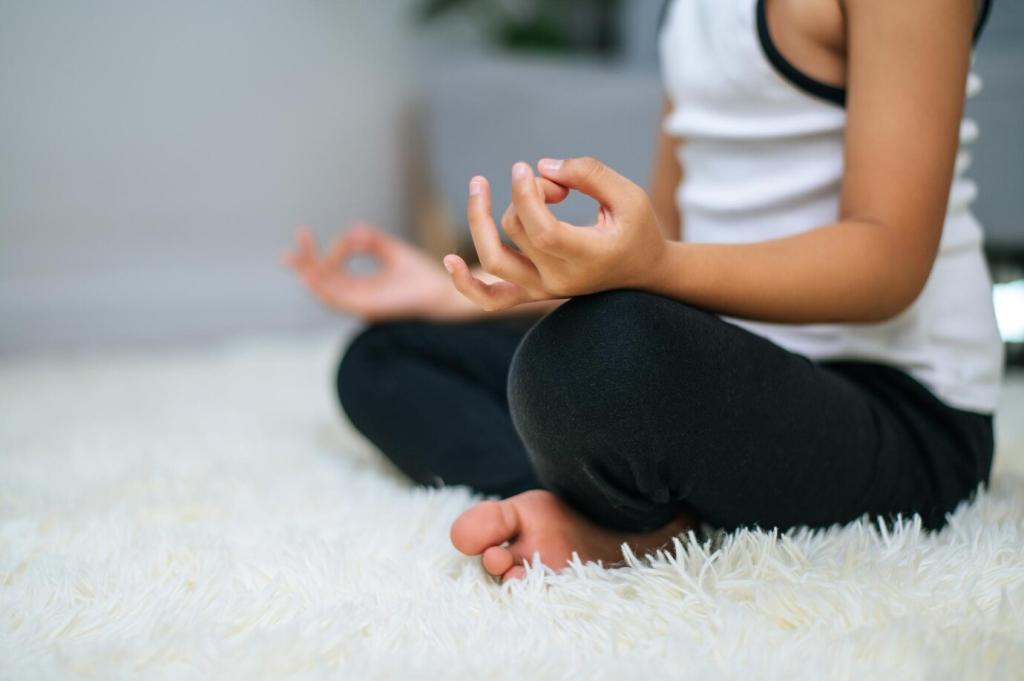
Understanding the Science Behind Meditation and Stress Relief
Today’s chosen theme: Understanding the Science Behind Meditation and Stress Relief. Join us for a warm, research-backed journey into how meditation reshapes your brain and body to dial down stress and open space for calmer, clearer living.
How Meditation Calms the Brain Under Stress
Meditation strengthens prefrontal control while softening hyper-reactive amygdala signals, improving emotional regulation under pressure. Over time, practitioners report fewer spikes, quicker recovery, and better decisions when life throws curveballs. Share your toughest moments you hope to navigate.
How Meditation Calms the Brain Under Stress
The default mode network lights up during mind-wandering and rumination. Mindfulness trains awareness of wandering and gently returns attention, reducing repetitive worry loops. Notice fewer what-if spirals? Comment with your experience or questions below.
How Meditation Calms the Brain Under Stress
Consistent practice nudges neural pathways toward steadier attention and resilience. Studies suggest structural and functional changes accompany improved mood and focus. It starts small, then snowballs. Subscribe to follow practical drills that build plasticity week by week.
Hormones, Breath, and the Stress Response
Cortisol and the HPA Axis Reset
The hypothalamic–pituitary–adrenal axis drives cortisol during stress. Meditation can reduce baseline cortisol and dampen reactivity, helping you recover faster after challenges. Track your mood before and after sessions and tell us what patterns you notice.
Vagus Nerve and Heart Rate Variability
Slow, steady breathing and mindful attention stimulate vagal tone, raising heart rate variability—an adaptive marker of stress resilience. Try six breaths per minute for five minutes. Did your shoulders drop? Share your HRV experiments with our community.
The CO2 Balance and Calm Breathing
Shallow over-breathing lowers CO2 and can fuel anxiety. Gentle nasal breathing stabilizes CO2, supports oxygen delivery, and signals calm. Pair breath with attention for compound benefits. Bookmark this tip and invite a friend to breathe with you.
Evidence You Can Trust: Trials and Meta-Analyses
Mindfulness-Based Stress Reduction in Clinics
MBSR programs often show moderate reductions in perceived stress, anxiety, and pain across diverse groups. Beyond scores, participants report better sleep and calmer reactions. Have you tried a structured course? Comment with wins and hurdles you faced.
Focused Attention vs. Open Monitoring
Focused attention anchors on the breath or a chosen object, training stability. Open monitoring notices sensations and thoughts without clinging. Both ease stress through awareness and flexibility. Which fits your temperament? Tell us and we’ll tailor future guides.
Dose Matters: Minutes, Consistency, and Adherence
Research suggests consistent, modest daily practice often beats sporadic long sessions. Even ten minutes can help if repeated. Choose a realistic dose and track changes. Subscribe for weekly templates that make adherence pleasantly automatic.
Measuring Your Own Stress-Relief Journey
Complete the PSS once a week at the same time to reduce noise. Pair scores with notes about sleep, caffeine, and workload. Notice trends, not single blips. Share your graph and we’ll cheer your milestones.
Measuring Your Own Stress-Relief Journey
Meditation often improves sleep onset and quality. Use a simple sleep diary or a device to track duration and regularity. Celebrate small gains like quicker wind-downs. Comment if you want a beginner-friendly template.


Stories from the Field: When Science Meets Daily Life
The Deadline Week Turnaround
During exams, a student set three breath breaks before study blocks. Rumination fell, focus grew, and sleep returned by day four. What micro-habit might stabilize your hardest week? Share your plan and we’ll support you.
A Nurse Between Night Shifts
Five mindful minutes in a quiet stairwell became a reset ritual: longer exhales, softer gaze, kinder self-talk. HRV nudged up, headaches receded. Know a caregiver who needs this? Send them this story and invite them along.
You, Right Now
Notice your breath, jaw, and shoulders for thirty seconds. Name one sensation without judging it. That tiny pause is science in action. Comment how you feel, then subscribe for next week’s guided reset.



Myths, Facts, and Nuance
Meditation is not erasing thoughts. It is noticing, returning, and relating skillfully. Relief arises from repetition, not perfection. What myth held you back? Share it so we can debunk it together next post.

